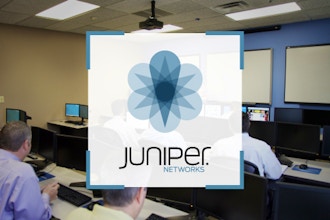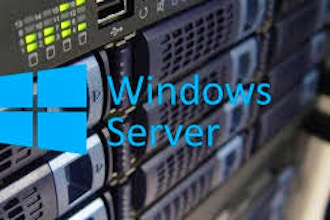This five-day course is designed to provide students with the tools required for implementing, monitoring, and troubleshooting Layer 3 components in an enterprise network. Detailed coverage of OSPF, BGP, multicast, class of service (CoS), and EVPN-VXLAN is covered in depth.
The course also exposes students to common troubleshooting commands and tools used to troubleshoot various intermediate to advanced issues. Through demonstrations and hands-on labs, students will gain experience in configuring and monitoring the Junos operating system and in monitoring device and protocol operations
Intended Audience
This course benefits individuals responsible for configuring and monitoring devices running the Junos OS.
Course Objectives
After successfully completing this course, you should be able to:
- Describe the various OSPF link-state advertisement (LSA) types.
- Explain the flooding of LSAs in an OSPF network.
- Describe the shortest-path-first (SPF) algorithm.
- Describe OSPF link metrics.
- Describe the various OSPF authentication methods.
- Explain the differences between OSPFv2 and OSPFv3.
- Describe OSPF area types and operations.
- Configure various OSPF area types.
- Summarize and restrict routes.
- Configure OSPF multi-area adjacencies.
- Configure OSPF virtual links.
- Explain OSPF external reachability.
- List useful commands that are used to troubleshoot and verify OSPF.
- Isolate different OSPF issues.
- Describe BGP operations.
- Configure various BGP options.
- Explain the route selection process for BGP.
- Describe how to alter the route selection process.
- Explain the use of routing policies in BGP.
- Explain how BGP routes are processed.
- Describe the various BGP attributes and their use.
- Manipulate common BGP attributes.
- Review common BGP troubleshooting procedures.
- List common BGP troubleshooting commands.
- Identify issues with BGP peering.
- Explain reasons to use BGP in the Enterprise.
- Explain how ISP policies can influence external connectivity.
- Describe three common routing policies for external connectivity in the enterprise.
- Identify common commands for troubleshooting routing policy.
- Describe basic multicast terminology.
- Describe the multicast address space.
- Describe how RPF is used in a multicast network.
- Describe the basic functionality of IGMP.
- Describe the multicast service models and modes.
- Describe PIM-SM operation and configuration when using the ASM model.
- Describe PIM-SM operation and configuration when using the SSM model.
- Verify and troubleshoot multicast.
- Identify environments that may require a modified CoS implementation.
- Describe the various CoS components and their respective functions.
- Explain the CoS processing along with CoS defaults on SRX Series devices.
- Describe situations in which some CoS features are used in the enterprise.
- Describe the use of the Real-Time Performance Monitoring tool.
- Verify and troubleshoot CoS.
- Describe a traditional Campus network design.
- Understand the need for a new architectural design.
- Describe the five key concepts of the Evolved Core.
- Describe the benefits of a Layer 3-based Campus Networks.
- Describe Layer 2 tunneling.
- Explain VXLAN functionality.
- Describe VXLAN gateways.
- Describe EVPN features.
- Describe EVPN operations.
- Describe EVPN with VXLAN for data plane encapsulation.
- Configuring a Spine Only EVPN-VXLAN network.
- Add IP Fabric nodes to the Spine Only architecture.
- Configure a new IP Fabric EVPN-VXLAN network.
- Understand EVPN route information.
- Review useful EVPN-VXLAN commands.
Course Outline
Day 1
- Chapter 1: Course Introduction
- Chapter 2: OSPF
- Chapter 3: OSPF Areas
- Chapter 4: Advanced OSPF Options
Day 2
- Chapter 5: Troubleshooting OSPF <="" li="" style="box-sizing: border-box; margin: 0px; padding: 0px;">
- Chapter 6: BGP
- Chapter 7: BGP Attributes and Policy
- Chapter 8: Troubleshooting BGP
Day 3
- Chapter 9: Enterprise Routing Policies
- Chapter 10: Troubleshooting Policies
- Chapter 11: Introduction to Multicast
Day 4
- Chapter 12: Multicast Routing Protocols and SSM
- Chapter 13: Troubleshooting Multicast
- Chapter 14: Class of Service
- Chapter 15: Troubleshooting Class of Service
Day 5
- Chapter 16: Enterprise Architectures
- Chapter 17: VXLAN
- Chapter 18: EVPN-VXLAN
- Chapter 19: Configuring EVPN-VXLAN
- Chapter 20: Migrating to an IP Fabric
- Appendix A: BGP Route Reflection
- Appendix B: Troubleshooting IS-IS
- Appendix C: Additional Troubleshooting
Prerequisites
Students should have basic networking knowledge and an understanding of the Open Systems Interconnection (OSI) model and the TCP/IP protocol suite. Students should also have working experience with basic routing principles.
Students should also attend the Introduction to the Junos Operating System (IJOS) and Junos Intermediate Routing (JIR) courses prior to attending this class.
This course is available for "remote" learning and will be available to anyone with access to an internet device with a microphone (this includes most models of computers, tablets). Classes will take place with a "Live" instructor at the date/times listed below.
Upon registration, the instructor will send along additional information about how to log-on and participate in the class.




 CourseHorse Gift Card
CourseHorse Gift Card









